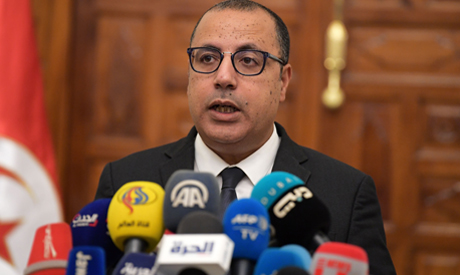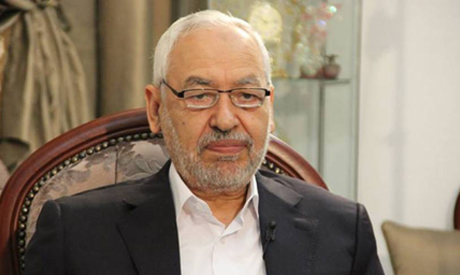Tunisia’s new Prime Minister Hichem Al-Mechichi finally announced the formation of his new government this week, putting together a government of technocrats that includes 28 independents, among them people who served in the previous government and eight women, to handle the North African country’s political divisions and economic challenges.
The government was expected to be revealed almost five days ago, a situation which reflects how hard the talks leading up to its formation have been.
Tunisian President Kais Saied assigned the task of forming the new government to Al-Mechichi on 25 July after his predecessor Elyes Al-Fakhfakh resigned amid a clash with the Islamist Ennahda Party.
The country’s parliament will now decide whether to accept or reject the new government. The expected vote coincides with clear opposition to Al-Mechichi's vision towards the cabinet formation by Ennahda and political forces that are closely connected to it.
They have recently expressed dissatisfaction with the country's premiers.

Mechichi
The Islamist Party opposes Al-Mechichi’s cabinet, and it has the largest number of seats in parliament with 54 seats. It is followed by the Qalb Tounes Party (27 seats), the Democratic Current (22 seats), the Al-Karama Bloc (19 seats) and the People’s Movement (15 seats), the news channel Al-Arabiya reported last week.
The Free Destourian Party (17 seats), the National Reform Bloc (16 seats), the National Bloc (11 seats), Tahya Tounes (16 seats) and the Future Bloc (nine seats) seem to be backing Al-Mechichi’s new government.
Saied will have to dissolve the parliament in case if it votes against the government put forward by Al-Mechichi and call new legislative elections. For this reason, experts say a "yes" vote is more likely.
Mahmoud Al-May, a member of the constituent assembly that drafted the country’s new constitution after the 2011 Jasmine Revolution, believes that the parliament will approve the cabinet as “it fears being dissolved” if it does not do so.
“Ennahda will be the biggest loser in case of new elections, with Qalb Tounes risking disappearing altogether,” Al-May said, adding that government-formation process "will never happen" if it was not concluded within 30 days.
Sarah Yerkes, a senior fellow at the US Carnegie Endowment for International Peace, agreed, adding that this is the third attempt to form a government in Tunisia in less than a year, referring to problems caused by the distribution of seats in parliament.
“The problem is not the amount of time allotted to the government-formation process. The problem is due to the fractured nature of the parliament, where no party holds even a quarter of the seats and there is no real ruling coalition or opposition,” she said.
Instead, Yerkes said, the parliament is made mostly of a "bunch of small parties and individuals with divergent interests who have a hard time coming to agreement".
Talks on a new government took place during major tensions between Ennahda and anti-Islamist forces.
Al-Fakhfakh resigned after Ennahda had reportedly managed to secure the required 109 votes to remove him from his post, with the escalation taking place after Al-Fakhfakh had said he would conduct a cabinet reshuffle and ignore the Islamist Party’s request to hold consultations and add new parties to the ruling coalition.
Al-Fakhfakh then ousted all the Ennahda ministers from his government, benefiting from his position as caretaker prime minister. The political crisis even grew further when opposition MPs submitted an official request to hold a vote of no-confidence against Ennahda's leader and parliament speaker Rached Al-Ghannouchi last month.
They accused him of disregarding the authority of the president, trying to expand his own, and seeking to impose a Muslim Brotherhood agenda on Tunisia.
At first it was believed that Ennahda would be out of the government for a short period despite its strong representation in parliament. But now it seems that this period will last longer than expected, causing anger among the party’s leadership.
Ennahda’s exclusion from government has been clear since Al-Mechichi, a member of the National Commission for the Investigation into Corruption established in 2011 and an ex-legal adviser to Saied, was appointed to head it.

Ghanoushi
Al-Ghannouchi said that Tunisia “needs an economist, not a legalist,” in order to serve as a “successful manager.” There was a need for a prime minister who has “actual experience” and not just “theoretical knowledge,” he said.
Arnaud Kurze, an associate professor of justice studies at Montclair State University and a fellow at the Woodrow Wilson Center in the US, said that recent opinion polls had shown smaller parties benefitting if there were new elections, while Ennahda could lose seats if parliamentary elections were held.
Kurze was referring to the Free Destourian Party, the Reform Party, the Al-Watania Party and Tahya Tounes, which he believes have decided to back Al-Mechichi as they would “likely be the winners” in the new government.
He said that it remained to be seen whether Saied would be able to harness the new government of independent technocrats and experts to defuse the political tensions between the country’s secularists and Islamists or whether the political establishment would be able to dominate the political process, hampering long-overdue social changes.
“After years of stalemate and status quo politics, often accompanied by corruption scandals, the smaller parties, which favour independent, technocratic cabinet choices, see an opportunity to change the governance system in Tunisian politics. If the current head of state is able to play his cards right, these political opportunities might play out in favour of Tunisian society,” Kurze said.
“However, we shouldn’t forget that this process does not occur in a vacuum, and established elites have an interest in influencing the outcome to maintain power, whether on the secular or the Islamist end of the spectrum,” he concluded.
*A version of this article appears in print in the 27 August, 2020 edition of Al-Ahram Weekly.
Short link: